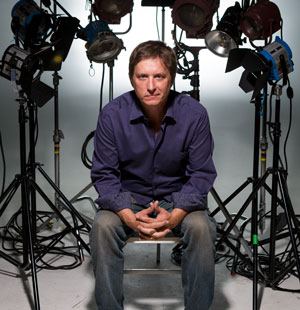
Jasper loves it when the work of local artists takes them away from Columbia–as long as they come back home and are generous enough to share their adventures with us while we’re waiting on them.
Local filmmaker Wade Sellers’ newest project has taken him to Japan where he’ll be working for the next ten days. Lucky for us, Wade has agreed to post a series of blogs detailing his journey and his work while away. Below, you’ll find an introduction which will help you frame the parameters of Wade’s project, as well as the first two installments in this series of posts.
We’re looking forward to traveling vicariously via Wade and hope you’ll visit with us regularly so you don’t miss a minute of his journey.
Introduction to the Project
Three years ago I was approached by Jeff Wilkinson, reporter for The State newspaper, about video taping a couple of interviews with World War II veterans from South Carolina. Two other Columbia based independent filmmakers, Lee Ann Kornegay and Heidi Lanni, had helped Jeff with a few interviews at that point and neither was available for a taping in Greenville.
The project had been resurrected by Elaine Freeman, then Executive Director of the ETV Endowment of South Carolina, and John Rainey. At that time there were no plans of what to do with the footage. John stated “our mandate should be to interview as many of these men as we can before they leave us.”
To date we have interviewed 157 veterans from South Carolina. We had plans for a one hour show. After that hour aired we made a commitment for two more. After the second aired a total of seven hours was requested.
Every once in a while we run across a veteran we dub a “rock star”. He or she has a story so incredible that you can only think it would exist in a movie. Moffat Burriss was the first. He is from Chapin, and was portrayed by Robert Redford in the film A Bridge Too Far. We followed Moffatt back to Holland on his 90th birthday to celebrate the 65th anniversary of his company’s capture of the bridge at Nijmegen.
Charles Murray was our second rock star. He received the Medal of Honor for his heroic actions at Kaysersberg, France. We followed him as he traveled back to Kaysersberg and Berchtesgaden, Germany along with fellow members of the 3rd Infantry Division, to be honored by those respective cities.
From this footage, two half-hour biography shows were created entitled Man and Moment. One focused on Charles Murray and the other on Moffatt Burriss. During the time that we traveled to Europe, following these heroes back to their battlefields, we had been asking a third gentleman if he would like to return to the site of his greatest battle. That gentleman was Ted Bell.
Ted Bell lives in Columbia. He is 93 and prefers a quiet life with his wife. He doesn’t like to be recognized for his service. He was a company commander on Okinawa and commanded a daring night raid on Ishimi Ridge. Leading 225 men, his company engaged Japanese soldiers for three days. In the end, they secured the ridge. He returned to his base with only 25 men from his company surviving the fight.
For the next ten days we are following Mr. Bell, and his son Teddy, back to the site of this battle. This will be his first time returning to Japan since he left in 1944.
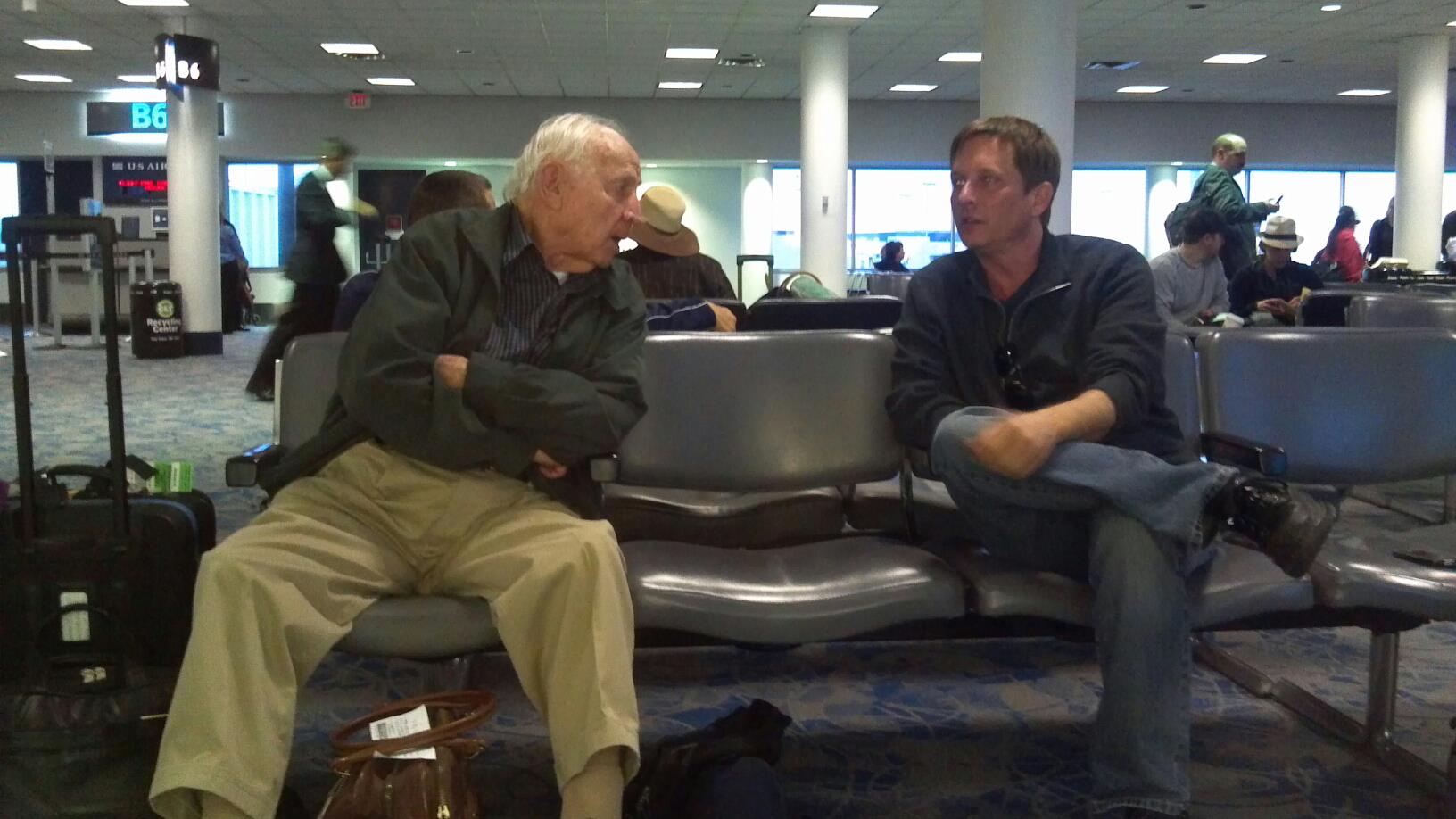
Journey to Japan, Part I
I have been making my living as a filmmaker for many years. My work stretches from documentary to commercial work. The one consistent feeling I always have, when a project is completed and viewed, is the sense of amazement that the idea that seemed so simple in the beginning has been completed. When the film is first screened, I also feel nauseous. This is always from nerves. The realization that an idea that has grown to be very personal through many months of living with it is about to be seen by others.
With these posts I want to share my experiences as I go through a crucial period of production on a current project.
I have been involved, as director and editor, on a documentary series entitled South Carolinians in World War II. As an extension of this series we have produced two half hour programs titled Man and Moment. These shows focus on veterans with extraordinary stories during their service in World War II. As part of the first two shows we followed two veterans of World War II back to the areas of their greatest achievements in Europe. To complete the series we asked Ted Bell, a veteran of the Pacific, to return to the site of his greatest battle–Okinawa, Japan.
After two years of asking, he finally agreed.
We approach the Man and Moment shows very honestly. We never start with a script. Footage is captured, an outline is created and the story of their life and service is shaped based around the one critical moment of their service during WWII. With the first two shows, the veterans were returning to Europe as part of an invitation. Ted’s return to Okinawa is different. We asked him to go back. We simply want to follow Ted, and his son, as he travels back to Okinawa for the first time since he fought a courageous and heart-breaking battle–the last he would fight during World War II.
Hopefully these posts will give an insight into some behind the scenes moments during production of a documentary piece. MW.
Production-Day 1
The “sun came out and all I could see around me were dead bodies.” — Ted Bell
We flew to Los Angeles from Charlotte last night. After an hour and half plane delay and waiting a bit for the baggage, we got into our hotel at 12:30am (3:30am back home). Sunday was originally planned to be a day of rest for Ted before a fourteen hour plane ride to Okinawa.
A quick production note–we began planning for this trip six weeks ago. With all of the logistics involved in coordinating with the Bell’s, the US Army in Okinawa, and requesting shooting permits around the island of Okinawa, this was not the optimal amount of time. So, when during the pre-production process we came in contact with an enlisted man named Joe Casillas, who served under Ted Bell at Okinawa and who happened to live just north of Los Angeles, our day off became a great opportunity to reunite these two men.
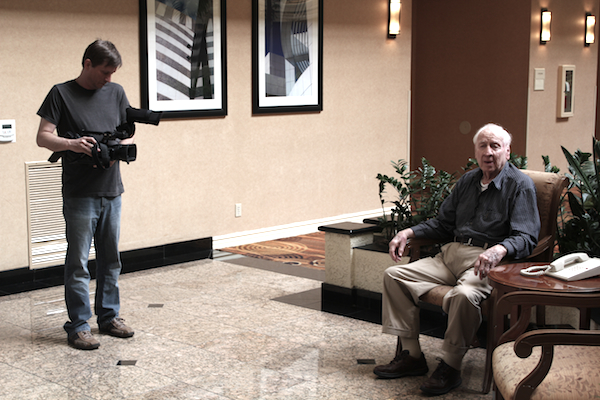
Ted Bell had never personally met Joe Casillas. Ted was Joe’s commanding officer. He had probably seen his face, but doesn’t remember him from Okinawa. Joe contacted Ted a number of years ago in an effort to reconnect with living members of the 77th Infantry Division. Joe and Ted are the only known living members of the 77th Infantry that fought at Okinawa.
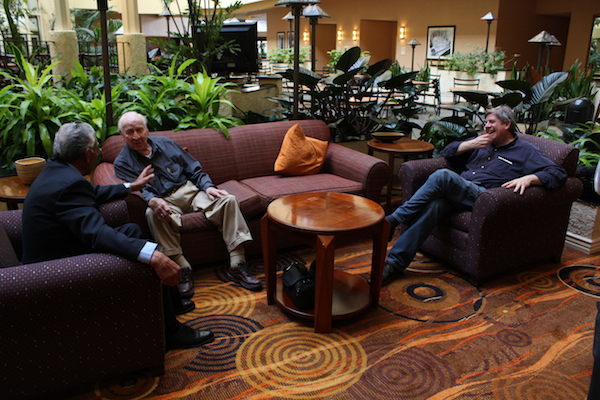
We organized a reunion for the two men. Joe arrived at our hotel, with many members of his family, and the two began immediately talking about the war. We captured all of this on video. After an hour or so of introductions we brought Joe back to our suite to interview him about his experiences during the war. His story was one of an enlisted man, a replacement, who was introduced to one of the most brutal battles on Okinawa. From a filmmaking perspective there is always a point when we know someone has “made the movie”. Joe’s was when he explained how after three days of intense fighting the “sun came out and all I could see around me were dead bodies.” This is what we have to look for. We interview these men to help us paint the picture.
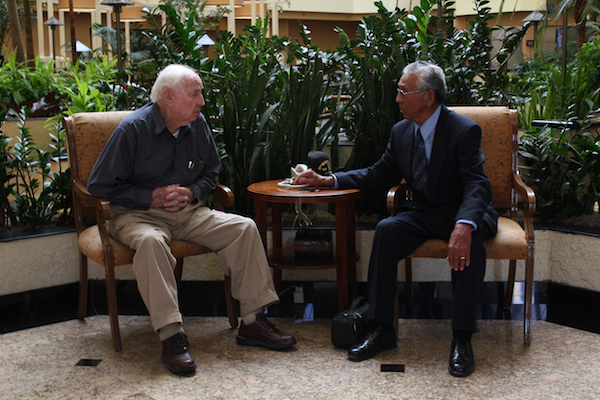
Tomorrow morning we hop on a Nippon Airlines flight bound for Okinawa.
(Wade Sellers is an independent filmmaker and commercial producer living in Columbia, SC. He owns and operates Coal Powered Filmworks, an independent film production company.)

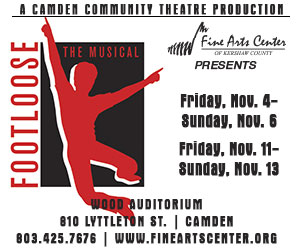



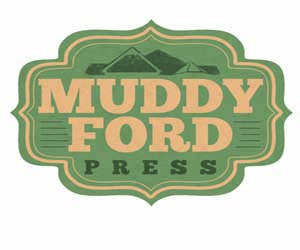
.jpg)
I am excited to be able to experience this documentary. My father fought in the Pacific during WWll and never really talked about it to his daughters.
Wade,
These are stories that need to be told-thank you for doing it for these men and all of us. I’m proud of you and your work.
My father was an Army officer, and in 1957 he was stationed in Taiwan, as was Colonel Bell and his family. Friendships were formed, which persisted. Later, back in the U.S. we continued to socialize, and my father and Col. Bell would go out occasionally to Washington for a “boy’s night”.
My memory of Colonel Bell was of a man with a quiet, understated sense of humor, and a man who was always good company. My father, several times over, expressed that Col. Bell had a depth to him, and an honesty, that he knew in few men. I suppose my father may have known of Col. Bell’s war record, but typically, most of the soldiers I knew from that generation seldom spoke of their war, and in all the years I knew him and his family, I never heard it mentioned.